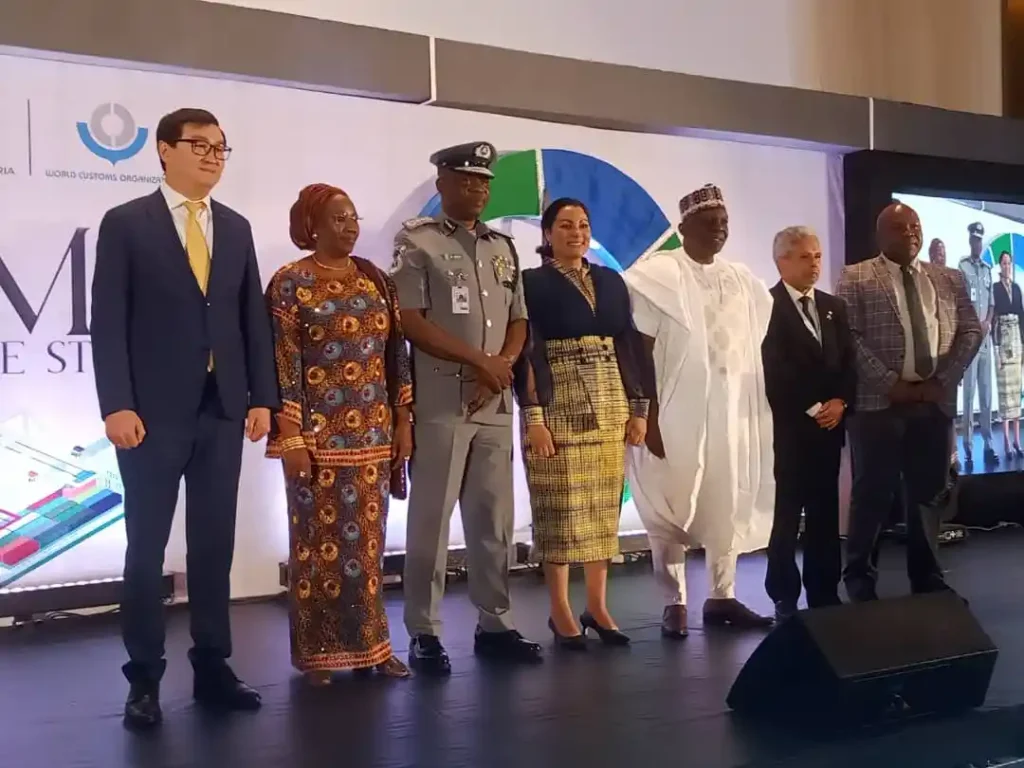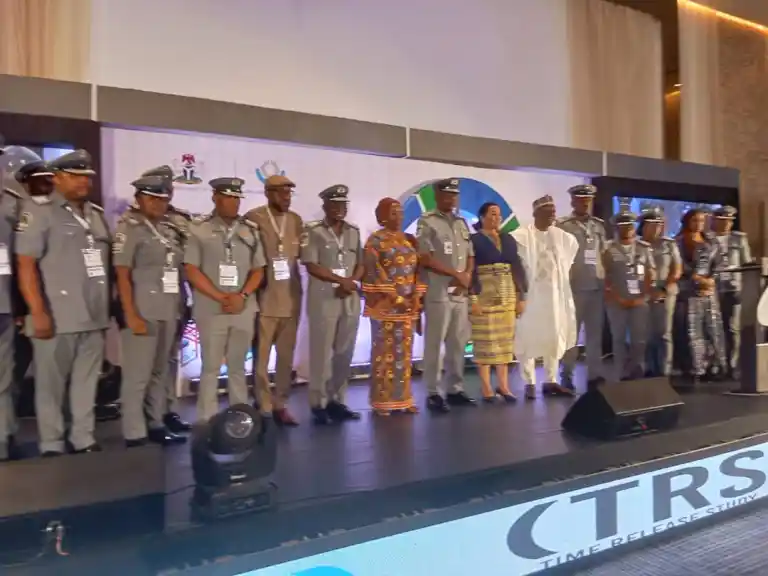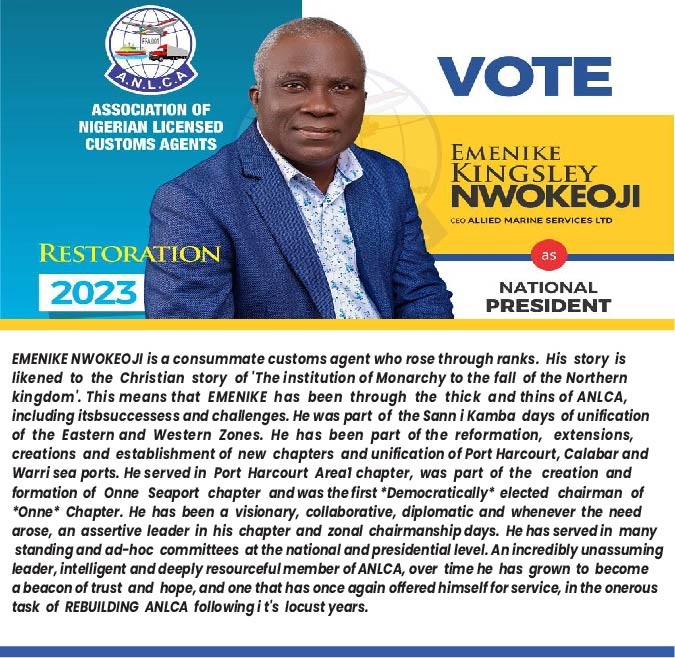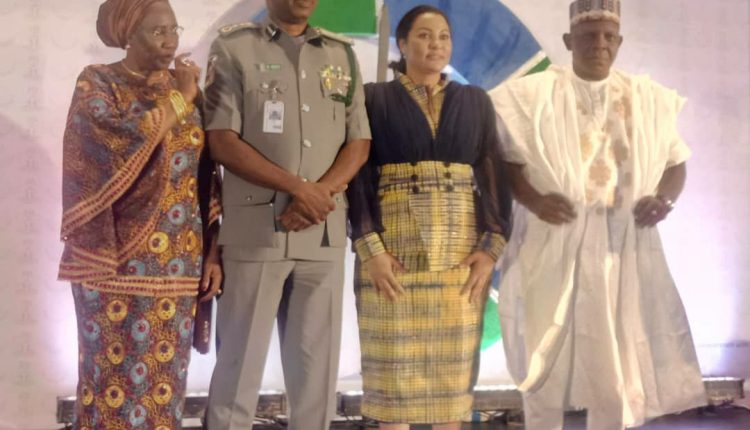Development Partners Speaks On Launch of TSR
…As Adeniyi Urge Purposeful, Sincere Collaboration
BY EGUONO ODJEGBA
Stakeholders and development partners have expressed confidence and total support for the implementation of the World Customs Organisation, WCO, assisted Time Study Release, TSR, to enhance customs operations in Nigeria.

The launch of the TSR in Lagos yesterday, February 8, 2024 by the Comptroller General of the Nigeria Customs Service, NCS, Bashir Adewale Adeniyi MFR, was witnessed by the WCO Secretary General, Ministers of Finance, Marine and Blue Economy, Industry, Trade and Investments; captains of industry and the organized private sector among other critical economic players; some via virtual presentations.
Speaking during the launch, the CGC Adeniyi lauded the benefits of the TSR which pilot takeoff has been approved for operation at the Tin Can Island Command of the NCS, appealed to players and operators to commit whole heartedly, sincerely and meaningfully to the initiative to ensure its success.
“This collaborative approach holds promising potential as it strengthens our collective efforts. Evolving from a Customs-driven TRS to a Nationally driven engagement open doors to collaborative brainstorming and idea-sharing among stakeholders. Furthermore, this approach serves to bolster our internal capacity, as successful implementation at TINCAN Island Port can pave the way for replication in other ports across the country.
“Your support and collaboration are invaluable as we work towards achieving our shared goals of enhancing trade facilitation and driving economic prosperity for Nigeria”, he said.
This is even as the CGC who explained that the TRS is a WCO Tool designed to supports the growth of international trade note that stakeholders shared commitment to its success will enhance the efficiency and effectiveness of customs operations in all fronts.
Welcoming participants to the ceremony, Adeniyi said, “We value your time and active participation in this pivotal initiative, which holds significant implications for the future of Customs operations. Today we are joining other Customs Administrations in the world that have embraced the tools developed by the World Customs Organization,WCO, to promote the growth of international trade.
“The WCO remains steadfast in its commitment to advancing customs procedures through various instruments and tools, such as the Revised Kyoto Convention , RKC,WTO Trade Facilitation Agreement, TFA. Among these initiatives is the Time Released Study, TRS, developed to provide comprehensive insights into customs operations’ efficiency.”
Explaining the imperative, workability and reliability of the new tool for customs operations in Nigeria, the CGC said:
“The TRS method is a systematic and standardized approach used to measure the total duration of time from the arrival of goods at the customs border until their release. This initiative represents a critical step in our ongoing efforts to optimize the trading experience and customs operations in Nigeria.
“It is a strategic endeavour aimed at improving how we facilitate trade, ensuring alignment with international best practices, and contributing substantially to national development. TRS plays a crucial role in assessing and enhancing trade facilitation by providing detailed insights into the efficiency of our processes.”
He continues: “Our dynamic and rapidly changing environment requires swift and adaptable responses to the needs as they arise. Adopting a scientific and data-driven approach is paramount not only for customs administrations but also for all stakeholders involved in international trade. With the complexities of modern trade, traditional evaluation methods often fall short in accurately identifying bottlenecks and inefficiencies across the entire trading environment.
“The TRS methodology offers a systematic and precise analysis, enabling us to identify areas for improvement with accuracy. This scientific approach enhances the credibility and reliability of our findings, ensuring that efforts to optimize trade facilitation are targeted and effective. Embracing these methodologies allows stakeholders to collaboratively work towards enhancing trade efficiency and promoting broader economic development.”
The CGC disclosed that with two earlier attempts in 2010 and 2018 to achieve the current objectives, the time has come to make progress and be at par with global competitiveness and business trends; adding that reflection on the historical implementation of TRS in Nigeria will add depth to stakeholders understanding of its significance.
“In 2010, the Nigeria Customs Service underwent a comprehensive TRS conducted by the USAID MARKETS Project, focusing on the Apapa Port and Seme Border. This study employed standardized methodologies and precise time analyses, offering crucial insights into our operational dynamics. Subsequently, some twenty cross-cutting recommendations were made, including the development of an Authorized Economic Operator,AEO, program, implementation of a Single Window system, purchase of additional cargo handling equipment, infrastructure repairs at the ports, streamlining of terminal yard logistics, enforcement of truck safety standards, use of more scanners, implementation of paperless clearance, and imposition of penalties to deter non-compliance.
“A second attempt was made in 2018 to conduct another TRS exercise; however, it was unsuccessful due to the lack of proper collaboration among the relevant agencies. We have made significant progress since then, including the implementation of paperless clearance and advancements in our AEO programs. Additionally, provisions under the new Customs Act now speak to the imposition of penalties to deter non-compliance.
“The need for greater collaboration, underscored by the presence of three Honourable Ministers today, is a crucial lesson learned from past exercises. Recommendations such as the implementation of a Single Window have been longstanding, emphasizing the importance of collaborative efforts. Today’s TRS promises to take a different dimension, aligned with the President Bola Ahmed Tinubu led Administration policy targets aimed at promoting effectiveness and efficiency in all fronts, including trade facilitation and economic reform.”
According to the customs boss, other measures put in place ahead of the current launch includes the revitalization of the National Trade Facilitation Committee, NTFC, and extensive stakeholder engagements resulting in the signing of the Lagos Continental Declaration document.
“We are pleased to note the timely implementation of these activities, with further evaluations scheduled at the end of the first quarter of this year. NCS is keenly aware of the impact of its operational environment on its activities, which is why we are committed to exploring ways to alleviate difficulties faced by citizens.
“Through a deliberate effort to identify bottlenecks, we aim to gain a better understanding of the measures needed to resolve these issues. By prioritizing efficiency and transparency, we endeavour to enhance the overall experience for traders and stakeholders involved in international trade”, he assured.
Also speaking, the Minister of Finance and Coordinator of the Economy, Mr. Wale Edun represented by the Permanent Secretary, Mrs. Lydia Jafiya, said the implementation of the TRS would reinvent robust stakeholders engagement and foster business friendly environment strong enough to attract higher volume of international cargo to Nigeria.
On her part, the Minister of Industry, Trade and Investment, Mrs. Doris Uzoka-Anite, commended the leadership and management of the NCS for the initiative geared towards enhancing trade facilitation and operational efficiency.
“I am absolutely confident the initiative will be a great success and Nigeria will reap its benefit through sustained economic growth in the coming years,” she said.
Noting that the initiative and the expectations for effective trade facilitation required efficient coordination across the supply value chain, Uzoka-Anite said the ministry under her watch will do more to contribute to its overall successes, even as she called on other stakeholders to join in making a success of the TRS.
“I wish to announce that we will Re-launch and Revitalise the National Trade Facilitation Committee (NTFC) where the Federal Ministry of Industry, Trade, and Investment, the Nigerian Customs Service, and many other MDAs will work alongside the private sector to effectively plan and implement more successful trade facilitation reforms that will continually increase our trade volume year on year.”
Earlier, the Secretary General WOC, Mr. Lan Saunders who participated online note that whereas the TRS is a diagnostic designed to provide information on default and or weak operational patterns, he further explained that as a critical tool of the WCO, the methodology will also help Nigeria to comply with the provisions and requirement of Articie 7.6 of the WTO on Trade Facilitation Agreement, TFA.
“The TFA encourages WTO members to measure and publish their average release time of goods periodically and consistently. TRS is being conducted as a diagnostic to find bottlenecks in the trade flow process factually and to take necessary measures to improve the effectiveness and efficiency of border procedures by reducing clearance time.
“TRS is an instrument with which Customs and other government agencies, along with private sector stakeholders, can measure the cross-border flow process related to imports, exports, and transit movement of goods periodically,” he said.
Sanders listed the benefits of TRS to include improvement and strengthening of Customs administration efficiency, create better conditions for accelerating the international movement of cargo subject to import, export, transit; or any other Customs regime related to the clearance and release of cargo.
Industry player, commentator and member of the foremost Association of Nigeria Licensed Customs Agents, ANLCA, Joe Sanni, in a statement preceding the launch tasked the leadership of the NCS to genuine weed out all operational and human encumbrances along the line of cargo clearance to truly make TRS a success.
He said, “Aware of the fact that some infrastructural challenges dog the cargo clearance process presently, like the unstable network server services, the opaque cargo inspection process with so much human interfaces, general non-compliance of imports, non-establishment of SOP for government agencies, discretionary attitudes of Customs personnel, lack of data gathering units/departments to assist the process, it is a tall order to meet global standards of what TRS is meant to achieve.
“A lot has been put in place since 2006 towards achieving Trade Facilitation and predictability (TRS) of exit of cargo from the ports, especially the compliant ones. Some of these are the automation of stakeholders’ processes, establishment of the Pre-Arrival Assessment Report, PAAR, likewise the introduction of the Nigeria Integrated Customs Information System, NICIS, Version II.
“Now the focus of the Minister of Marine and Blue Economy –Alhaji Adegboyega Oyetola, and the Comptroller General of Customs (CGC) – Alhaji Bashir Adewale Adeniyi are trained on installing scanners in our ports through the involvement of Public-Private Partnership (PPP) arrangement and of course streamlining, harmonizing all other interactive processes. The PPP arrangement must not fail to incorporate scanners training facility and spare parts manufacturing unit for sustainability.
“Another process that is sure to aid TRS to inch Nigeria towards global standards is the activation of Advance Ruling, as provided for in Section 24 (1-9) of the Nigeria Customs Service Act 2023, and the practical introduction and kick-starting of the scanning of cargoes directly from the vessel onto the terminals, for results/images to be analyzed immediately after, for further actions.”
Sanni expressed reservations about the current capacity of server services on the success of the TRS, noting that the providers have done a shoddy job so far, spanning years of contractual incompetence.
“The new challenge that is bound to still keep Nigeria far away from meeting global standards in cargo clearing, in terms of timing, are the incessant server breakdowns, lack of Data over the years for analysis and profiling of imports, importers and stakeholders involved in the cargo clearance process and eliminating human interfaces.
“For Nigeria to belong to the league of countries where cargo delivery time is predictable, especially for supply chain purposes, we must, but not fail to put some fundamental infrastructures in place. If our supply chain management, our industries, our distributive systems must run seamlessly with very minimal disruptions, then the Ports’ infrastructure must be improved; automation of all stakeholders’ processes must be decreed into existence and made functional within months, as target.
“Enough of this running around in circles. TRS is desirable for business decision makers to keep businesses performing optimally, Nigeria must also aim at ensuring our ports works 24/7, by installing CCTV cameras and illuminating every nook and cranny of the ports”, he said.
The management of the NCS Decemeber 2023 constituted the TRS Implementation Committee under the chairmanship of the Customs Area Controller, Tin Can Island Command, Comptroller Dera Nnadi mni. The committee is expected to supervise and implement the pilot scheme at Tin Can Island Command, and upon its successful implementation will be escalated to other border commands of the service.






